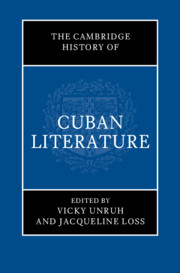Book contents
- The Cambridge History of Cuban Literature
- The Cambridge History of Cuban Literature
- Copyright page
- Dedication
- Contents
- Figures
- Contributors
- Acknowledgments
- Introduction Unfinished Histories
- Part I Literature in the Early Colony
- Part II Cuban Literature’s Long Nineteenth Century
- Part III Literary and Intellectual Culture in the Twentieth-Century Republic
- 13 The Literary Intellectuals of the Early Cuban Republic
- 14 The Invention of the Black Cuban in the Early Twentieth Century
- 15 The Fluid Expressive Communities of Cuba’s Interwar Avant-Gardes
- 16 Lydia Cabrera and Afro-Caribbean Imaginaries
- 17 The Fictions of New Urban Subjects
- 18 The Esthetics of Dulce María Loynaz
- 19 José Lezama Lima and the Orbits of Orígenes
- 20 Alejo Carpentier and Cuba’s Literary Twentieth Century
- 21 The Weighted Literary Islands of Virgilio Piñera
- Part IV The Revolution’s Literary-Cultural Initiatives and Their Early Discontents
- Part V Cuba and Its Diasporas into the New Millennium
- Epilogue
- Select Bibliography
- Index
- References
13 - The Literary Intellectuals of the Early Cuban Republic
from Part III - Literary and Intellectual Culture in the Twentieth-Century Republic
Published online by Cambridge University Press: 31 August 2024
- The Cambridge History of Cuban Literature
- The Cambridge History of Cuban Literature
- Copyright page
- Dedication
- Contents
- Figures
- Contributors
- Acknowledgments
- Introduction Unfinished Histories
- Part I Literature in the Early Colony
- Part II Cuban Literature’s Long Nineteenth Century
- Part III Literary and Intellectual Culture in the Twentieth-Century Republic
- 13 The Literary Intellectuals of the Early Cuban Republic
- 14 The Invention of the Black Cuban in the Early Twentieth Century
- 15 The Fluid Expressive Communities of Cuba’s Interwar Avant-Gardes
- 16 Lydia Cabrera and Afro-Caribbean Imaginaries
- 17 The Fictions of New Urban Subjects
- 18 The Esthetics of Dulce María Loynaz
- 19 José Lezama Lima and the Orbits of Orígenes
- 20 Alejo Carpentier and Cuba’s Literary Twentieth Century
- 21 The Weighted Literary Islands of Virgilio Piñera
- Part IV The Revolution’s Literary-Cultural Initiatives and Their Early Discontents
- Part V Cuba and Its Diasporas into the New Millennium
- Epilogue
- Select Bibliography
- Index
- References
Summary
This chapter showcases the writing of Cuban intellectuals of the early republican years, when excitement about the achievement of independence was muted by the overbearing presence and influence of the US and concerns about Cuban identity or “character” as a moral or social problem deemed as needing correction to achieve full-fledged, autonomous citizenship. Noting the continuing influence of ideals for an educated citizenry held by nineteenth-century philosopher-educator Enrique José Varona (vice president from 1913 to 1917); the hierarchies of Cuban ethnicities and negative stereotypes of Black Cubans promulgated in Fernando Ortiz’s early work and by essayist Francisco Figueras; and the role in these cultural conversations of Cuban journalism, including Cuba Contemporánea and Social, the chapter examines shifting views of what were portrayed as strengths or weaknesses of Cuban character in essays, drama, and novels by José Antonio Ramos, Miguel de Carrión, and Carlos Loveira, with attention to Jorge Mañach as a key figure in a second republican generation.
Keywords
- Type
- Chapter
- Information
- The Cambridge History of Cuban Literature , pp. 217 - 229Publisher: Cambridge University PressPrint publication year: 2024

